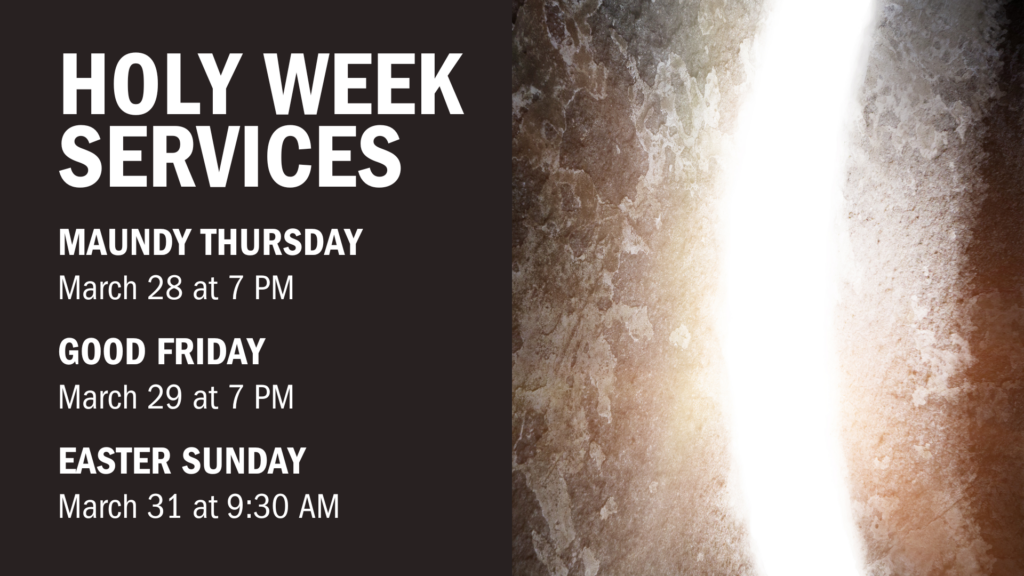“Dad, may I be the one to slam the book this year?” I remember myself asking when I was a teenager. I was with my father as he was preparing for Good Friday service. He had his heaviest book from his library beside a mic in the sound booth. At the end of the service, the book would be slammed shut as those present made their exit in silence reflecting on the seemingly final act, the stone closing the tomb, following Jesus’ crucifixion. He replied, “why don’t you practice?” I quickly realized that my hands would not be big enough to make the sound that I remember even today.
I think about these Holy Week memories fresh in my heart and mind as we experience a global pandemic and shelter in place orders require that we stay isolated and distant from one another for our safety. I ask myself several questions.
- What does it mean as a church that the season (Lent) when lament is most available to us is so very different this year under current circumstances?
- What role does lament have not only in my understanding of Lent and the events of Holy Week but in circumstances where suffering is ever-present in my life and the life of the church?
- How does Jesus’ lament on the cross instruct us when we are suffering?
And about the ninth hour Jesus cried out with a loud voice, saying, “Eli, Eli, lema sabachthani?” that is, “My God, my God, why have you forsaken me?” Matthew 27:46
“The language of lament has served the church throughout the ages. Laments are fairly common within the Bible and are the hardest texts to deal with. They raise uncomfortable issues. Rather than avoiding pain, laments run straight into it with a wealth of, at times, shocking images.” -Professor Ryan M. Teitz
In our western culture, we struggle with the idea of lament. We may even think that sharing so completely the pain and suffering in our lives and holding God responsible for that pain is complaining to God, amounts to sin, and we should avoid it. This is not the Biblical example we are given. We are allowed to ask “where God is when a community is struggling with his absence. What does it mean for the union of saints to plead for divine action while waiting in the tension between Christ’s two advents (Teitz)?”
J. Todd Billings writes, “God uses prayer that moves toward trust in his promises to change us. By the Spirit, God uses prayer with the self-presentation of Jesus Christ in Word and sacrament to incorporate us into Christ’s story, where we belong. We don’t have to suppress anger or confusion or misery before coming before the Almighty. With an open heart, we bring all of this before the covenant Lord, entrusting him to hear our cries and moving toward trust in his loving-faithfulness and covenant promises. Moreover, since we pray the Psalms with Christ and in Christ, all of our prayer resonates with the Lord’s Prayer. “Thy kingdom come, Thy will be done.” We ask God to “rule us by your Word and Spirit in such a way that more and more we submit to you.” As we pray this, we confess, “I am not my own”; we are displaced from our old self, which seeks autonomy, to find our true life in that of the crucified Lord, the One to whom the Spirit conforms us.”
The Biblical language of lament puts our feet back under us in a crisis when they have been swept away by discomfort, trauma and tragedy. It reminds us that we have a Savior who, knowing our suffering and pain, remains in loving relationship with us even when there are hard and raw things on our hearts and minds that we need to express. It reminds us that we have a God who is honored in our communities and in our own lives with our honesty and trust knowing that the answer to our current condition is found in Him alone.
Psalm 13 contains the basic structure of a lament and can serve as a guide for our own prayer life as we lament.
- Invocation and Complaint : v. 1,2
- Petitions and Cries for help : v. 3-4
- Declaration of trust : v. 5-6
This Good Friday, when we hear Jesus cry out in a loud voice, “my God, my God, why?” we understand He knew His loving Father could hear (and it would grieve Him to do so) these words from His Son even as He had to turn His face so that His work would be complete.
We understand that we can cry out to Our Father in the same way. We can call painful things what they are. We don’t pretend that we live without suffering. Instead, we suffer as people of Passion, people with hope knowing Christ endured suffering, death, and the Resurrection has come and is coming.
What are your burdens and those of your community and have you taken them honestly, and completely to Our Father in prayer?
For more information on lament:
Community in Crisis : Finding Communion through Lament by Dr. Tietz


